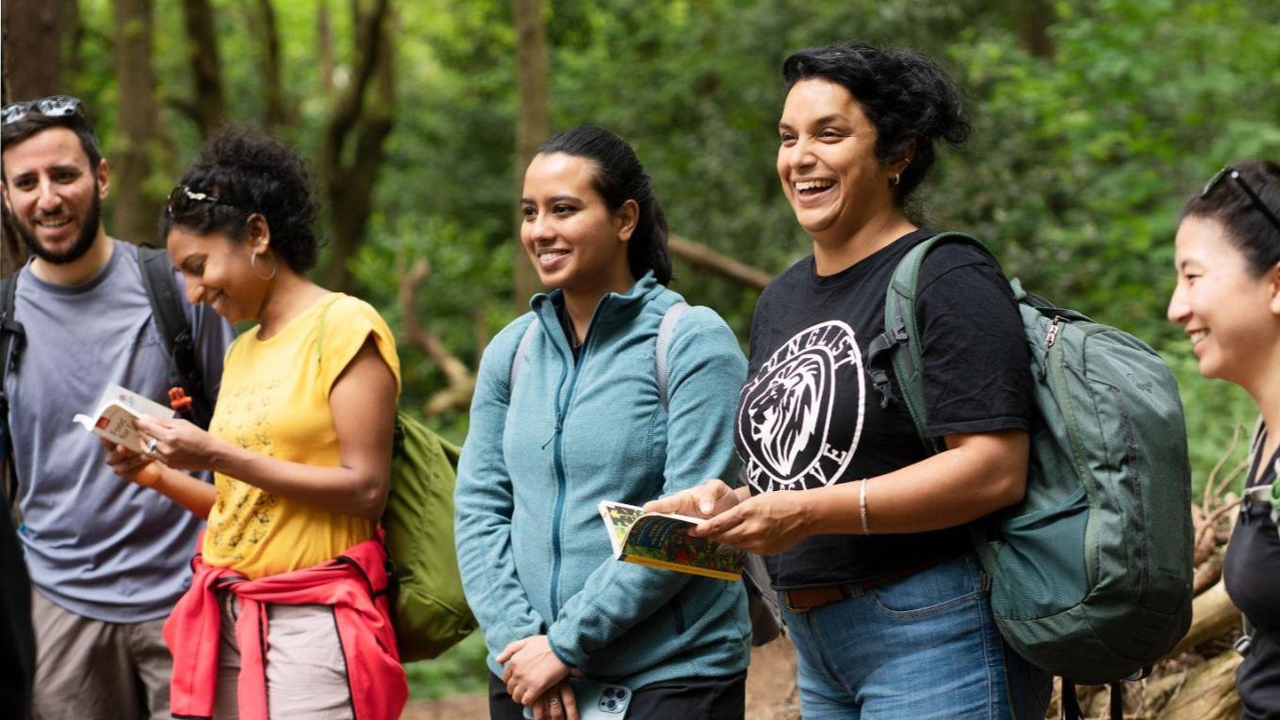
4, February 2024
Loving Urban Nature with National Park Cities
Hear the phrase ‘National Parks’ and you’d be right to think of rural places like The Lake District, Exmoor and Eryri (Snowdonia). But a pioneering programme is making urban areas greener, healthier and wilder – by awarding them National Park Cities status. It’s a global initiative, but the very first National Park City is London. We spoke to London National Park City’s Executive Director Mark Cridge to find out more.
Mark, you’re busy preparing to open London National Park City’s first ever visitor centre on Fleet Street. What’s it all about?
If you’ve ever been to a National Park visitor centre, you’ll know it’s where you find out about the park, what you can do there, all the great things that are happening. It’s exactly the same principle for the visitor centre in a National Park City.
 Pop-up Visitors Centre at 109 Fleet Street looking up towards St Paul's
Pop-up Visitors Centre at 109 Fleet Street looking up towards St Paul's
What exactly is a National Park City?
If you’re familiar with a National Park, you already know what a National Park City (NPC) is. National Parks are places for people and Nature to connect, where outdoor activities happen, for people to discover wildlife. National Park Cities applies the same principles to an urban area.
Because urban areas harbour a lot more Nature than might be initially obvious?
Exactly. Cities are very biodiverse. For instance, 49.7% of London is made up of green and blue spaces. Parks, rivers, allotments and front gardens are all important habitats; there are 15,000 species other than humans living in the capital, and more peregrine falcons here than there are in National Parks across the UK. Urban Nature is just as valuable as rural Nature.
So, it’s about connecting people in cities to the Nature around them?
Yes. NPC helps challenge people’s perception of what it means to live in a city. By 2050, about 70 percent of the world’s population will live in urban areas. We need to reestablish the connection between Nature and people because it will transform the way society in cities is organised. It will affect how we grow our food, how we travel, how we shop and work. And connecting with Nature really helps people; it’s good for mental health and can help combat loneliness. Supporting people to grow their own food collectively, for example – not only does it deliver education and healthy food, it brings people together and builds community cohesion.
It ‘s often surprising to find Nature in an urban environment… what’s the most unexpected example of Nature that you’ve come across in London?
We work with the London Fungus Network, and some of the stuff they teach is incredible; there are so many undiscovered fungus species in London. And one of the most exciting things that’s happened recently is the reintroduction to beavers to London at the wetlands in Ealing, which is fantastic.
What sort of things does NPC do to help people reconnect with Nature?
We have around 160 volunteer rangers from a broad range of backgrounds and with diverse areas of expertise. There are those who’ve worked in places like the RHS and Kew Gardens, allotmenteers, forest school teachers, forest bathing facilitators, artists, writers and photographers. They run guided walks, educational sessions, food-growing schemes, lots of events to bring city-dwellers closer to London’s rich Nature. We want to bring Nature to people rather than them feeling like they have to travel to find it. And we don’t want to ‘other’ Nature – we want to make it as accessible as possible, to as many people as possible.
 Ranger workshop at In A Field By A Bridge in Southwark
Ranger workshop at In A Field By A Bridge in Southwark
London became the first NPC in 2019 – are there any other NPCs?
Adelaide in Australia was awarded National Park Cities status in 2021, and five other global cities are currently going through the process of becoming NPCs. They are Breda and Rotterdam, both in the Netherlands, Chattanooga in the USA and Glasgow and Southampton here in the UK.
What should someone do if they believe their city should be an NPC?
The NPC scheme needs a combination of grassroots organisations who are willing to work together to take the idea on, as well as support from the city government. People can get in touch with us to find out more about the formal process, but our Journey Book is a great place to start. It sets out all the steps a city needs to go through to become an NPC.
How can those who live in a city that’s not yet an NPC connect with Nature?
Start from where you are and understand what’s around you. Look up your local branch of The Wildlife Trusts, The Conservation Volunteers, Groundwork, Friends of the Earth. These are just some examples of Nature-based groups where you can make a difference and connect with like-minded people – you might even meet those who want to start a campaign for your city to become an NPC! Once you find your people, you can do amazing things together.
The London National Park Cities visitor centre is currently open at 109 Fleet Street, London. Find out more at nationalparkcity.london.




